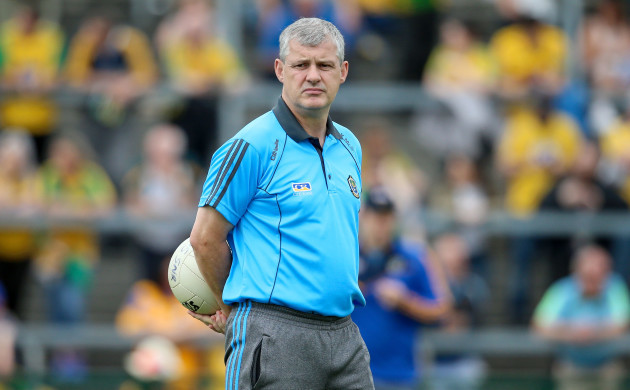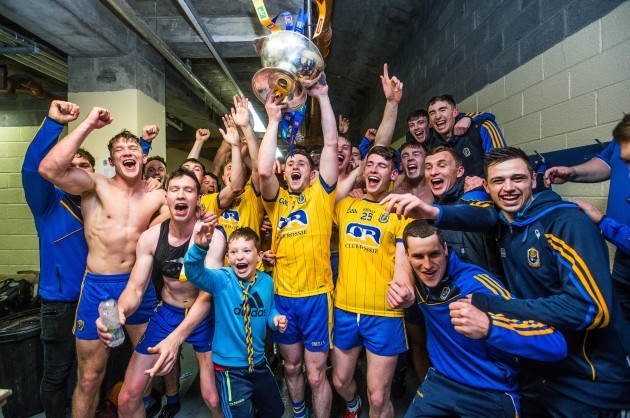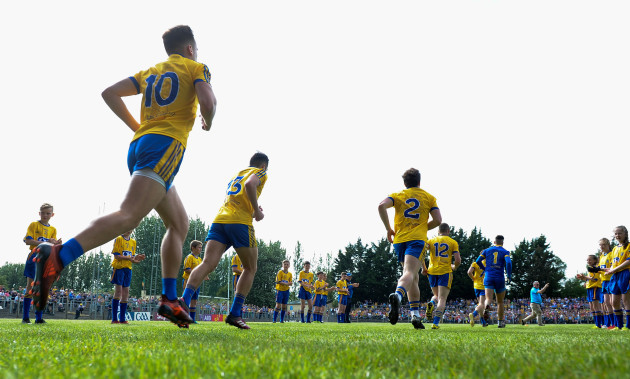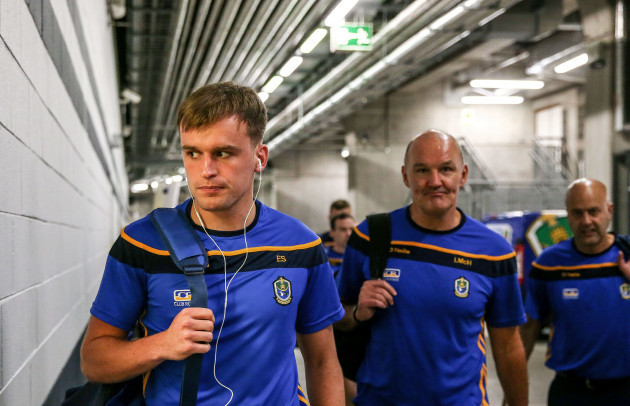LIKE EAMONN FITZMAURICE and Stephen Rochford recently, Kevin McStay left his role as county boss with time still remaining on his term.
The “negativity and criticism” surrounding his team was Fitzmaurice’s primary reason for vacating the Kerry hot seat, while Rochford resigned over a lack of support from Mayo’s board executive.
McStay had one year with the option of a second left on his deal with Roscommon, but confirmed his departure yesterday after meeting with county board chairman Seamus Sweeney.
Following the conclusion of Roscommon’s Super 8s campaign, Sweeney gave McStay his full backing to stay on for a further two seasons but the former St Brigid’s boss decided to step away.
He leaves behind him a young team in a very healthy state and his three years in charge must be considered a major success. Their biggest achievements under McStay include the 2017 Connacht title, the 2018 Division 2 league crown, reaching the Super 8s this year and taking Mayo to a replay in the All-Ireland quarter-final last summer.
Comparing Roscommon’s run over the last couple of years with other traditional football counties like Cork, Down and Meath shows how well they’ve done. That trio would have been thrilled to make the Super 8s this season.
While there were some reports of player unrest, McStay’s lengthy statement acknowledged that financial difficulties played a role in his decision to resign.
“I’ve done three years, every one of them challenging and sometimes exhausting,” he wrote.
“In reviewing my time in charge I have to acknowledge the inordinate amount of time I spent dealing with financial and facility issues, personnel issues, media issues and the various contentious and controversial events that kept arising over those seasons.”
In a week where Dublin’s significant financial resources have rightly come under the spotlight once again, McStay’s warning to Croke Park about the lack of financial supporter smaller counties receive is even more pertinent.
“Success is what we all crave but we must understand our reality too. While Roscommon is a proud football county, it is a small county with a limited playing pool and deficits in resources and facilities.
“The budget required to finance success at the highest level demands year-round attention. Facilities, catering, kit & equipment, professional expertise and, especially, travel costs are major financial drainers and they are placing a massive burden on voluntary officers that is often overwhelming.
“These are the significant challenges the smaller GAA counties face. If the GAA is committed to ensuring all counties are, at a minimum, competitive, then they must be supported financially in a way that reflects the demands and the need for fairness, equity and solidarity.”
It’s not the first time he has spoken out about these financial constraints. Last December, he revealed that it cost Roscommon an estimated €15,000 per week to run the senior football team alone.
They have a vibrant supporters vehicle in Club Rossie who raise significant funds, while the 2017 AIB fly-on-the-wall documentary helped bring in some much-needed finances.
Still, that didn’t stop the Roscommon management team being brought before a Croke Park interim finance committee to approve a budget ahead of the 2018 season. It involved relinquishing a mid-season training camp to reduce costs.
“There was certainly a difficulty around it and you’d prefer if it hadn’t to be that way,” McStay said at the time. “But that’s where some of the counties are. They are living from week to week, month to month, trying to (survive).
“I just don’t see where we personally can cut any more corners.”
That committee came to the county’s rescue due to an initial creditors bill in excess of €550,000, which has been significantly reduced due to grants from Croke Park. But the problem remains.
Dublin raised €1,519,526 in revenue through commercial and sponsorship ventures in 2017, but fundraising activities contributed just €55,000 of that tally.
Roscommon’s gross take under the same banner was €429,000, while their fundraising wing Club Rossie supplied €260,947 of that figure.
Roscommon’s end of year accounts showed team costs of €866,333 for all the teams they put out in 2017. They finished that financial year almost €50,000 in the red. In contrast, Dublin were able to splash out over €1.6m on team costs and still finish with a surplus in excess of €580,000.
As recently as May, McStay called for the GAA to fund travel and catering bills of counties to create a more level financial playing field.
“It’s down to simple mathematics,” he said. “The amount of money that’s coming in is not enough to cover what’s going out to pay for the game at all levels.
“I would say Roscommon has the smallest budget of any county in the top two divisions. But that’s where we’re at and we have to accept it. We simply cannot compete in terms of funding.
“If they want counties to be operating on a level playing field they could, for instance, pay the mileage and catering costs of every county in the country.
“That would give us the space here in Roscommon to operate without our hands tied behind our back. It would cost the GAA eight to €10 million for the whole country.
“We have a couple of great sponsors but it is very tough. We have 26 players in Dublin. Every time we bring them down the country for a training session it costs €1,000 for taxis alone. Just think about that.”
There has been talk of financial trouble in Roscommon and McStay’s decision to walk away suggests there might be a further tightening of the belt coming in 2019.
In order to compete in the arms race of inter-county football, team costs need to be rising – not heading in the opposite direction. Declan Hannon’s speech after Limerick’s All-Ireland hurling victory highlighted how inter-county backroom teams have swelled enormously in recent times.
Significant investment is required to even keep pace with the country’s elite teams.
If a top-eight side like Roscommon are struggling to this extent, where do the lower 24 counties stand? And what about dual counties who have twice the amount of teams to put out?
Dublin’s continued dominance is one thing, but if counties like Roscommon start to fall away from the chasing pack because they can’t afford to keep up, then the inter-county game is in real trouble.
McStay’s parting shot to Croke Park must be heeded.
The42 is on Instagram! Tap the button below on your phone to follow us!





